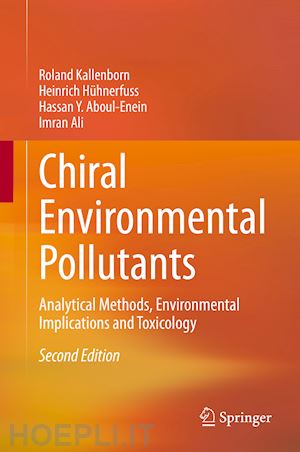
Questo prodotto usufruisce delle SPEDIZIONI GRATIS
selezionando l'opzione Corriere Veloce in fase di ordine.
Pagabile anche con Carta della cultura giovani e del merito, 18App Bonus Cultura e Carta del Docente
Introduction.- Criteria for the selection of a proper enantiomer selective analytical method.- Enantiomer selective high- and ultra-high performance liquid chromatography.- Enantiomer selective electrophoresis and electrochromatography.- Enantiomer selective high-resolution gas chromatography (esHRGC).- Other methods for the elucidation of molecular structures and mechanistic details of enantiomers.- Quality control and evaluation criteria for enantiomer selective separation methods in environmental sciences.- Enantiomer specific fate and behaviour of chiral contaminants.- Source Characterization and Contamination.- Chirality in environmental toxicity and fate assessments.- Perspectives.
Roland Kallenborn is a Professor of Organic Analytical Chemistry, Organic Environmental Chemistry at the Faculty of Chemistry, Biotechnology and Food Sciences (KBM) from the Norwegian University of Life Sciences (NMBU) and holds an Adjunct Professor position at the University Center in Svalbard (UNIS). As an environmental chemist, his mains research focuses on method development for identification, characterisation and mitigation of organic environmental pollutants (including contaminants of emerging concern and transformation products), and on elucidation of pollutant profiles in urban agriculture, food processing and Arctic environments. He applies modern trace analytical methods in an interdisciplinary context in his research strategies. Professor Kallenborn is author/co-author of 120 peer reviewed publications, 12 books (author, chapter author and editor), 20 contract reports, 10 popular science papers and 250+ presentations (poster/ oral) at international conferences andseminars. He serves as editor/ editorial board member for the Journals “Current Chromatography”, “Fresenius Environmental Bulletin”, “Ecotoxicology and Chemistry”, “Environmental Science and Pollution Research” and “Chemosphere”.
Heinrich Hühnerfuss is a Professor Emeritus at the Department of Chemistry of the University of Hamburg, Germany, where he started his studies in 1963, and received his Ph. D. in 1971. His main research interests include ecotoxicology, biota, water and sediment analyses, remote sensing and characterization of anthropogenic and biogenic monolayers at the air/water interface. Throughout his career, Professor Hühnerfuss has actively contributed to these fields by publishing +200 scientific articles and books.
Hassan Y Aboul Enein is a Professor Emeritus at the Pharmaceutical and Medicinal Chemistry Department, National Research Center in Cairo, Egypt. He was the Head of the Pharmaceutical Analysis Laboratory at King Faisal Specialist Hospital and Research Centre, Riyadh, Saudi Arabia. Professor Aboul-Enein is the author and coauthor of 1100+ refereed articles, 48 book chapters and 365 conference presentations. He is also authored and edited 8 books in the field of analytical chemistry. He is a Member of the World Health Organization (WHO) advisory panel in International Pharmacopoeia and Pharmaceutical Preparations and a Fellow of the Royal Society of Chemistry (UK).
Imran Ali is a Professor at Jamia MIllia Islamia Central University, New Delhi, India. He is a world recognized academician and researcher with 425+ scientific publications including patents, books, book chapters, research papers, technical reports and conference presentations. His work has been highly cited with a h-index of 80 and i10-index of 255. His research areas include chiral pollutants, nanotechnology for water treatment, bioanalytical and medicinal chemistry. He is a leading researcher in chiral pollutants and nanotechnology. Based on his international recognition and high citation, Prof. Ali is designated as fellow and chartered chemist by the Royal Society of Chemistry, London UK. His books and papers are being used as reference sources all over the world. The methods and technologies developed are also being used by many industries.











Il sito utilizza cookie ed altri strumenti di tracciamento che raccolgono informazioni dal dispositivo dell’utente. Oltre ai cookie tecnici ed analitici aggregati, strettamente necessari per il funzionamento di questo sito web, previo consenso dell’utente possono essere installati cookie di profilazione e marketing e cookie dei social media. Cliccando su “Accetto tutti i cookie” saranno attivate tutte le categorie di cookie. Per accettare solo deterninate categorie di cookie, cliccare invece su “Impostazioni cookie”. Chiudendo il banner o continuando a navigare saranno installati solo cookie tecnici. Per maggiori dettagli, consultare la Cookie Policy.